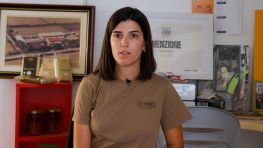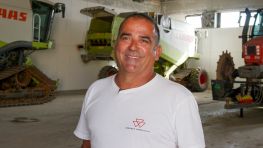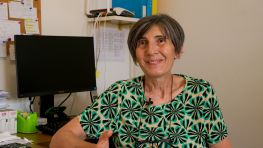 Rosalia Vacca and the Dream of…
Rosalia Vacca and the Dream of… Matteo Musso
Baraggia rice and integration with tourism.
Matteo Musso is part of that generation of farmers who have had and made the most of the opportunity to choose agriculture after a course of university studies. Matteo, a law graduate, returned to the family business after three years of apprenticeship, bringing not only new strengths but above all an alternative point of view.
With the recognition of the D.O.P. for the rice of Baraggia Matteo pushes to transform the family business from the traditional plant, with the production and sale of paddy, to a company that markets and sells its transformed product directly. In the lands of Baraggia, rice has been cultivated at least since the mid-1600s, as attested by documentary sources. A territory with a very particular conformation and soils: the Baraggia does not have alluvial soils like the Vercelli plain but morainic soils, fed by oxygenated but also very cold waters and characterized by a climate with significant temperature changes, conditioned by the proximity of the mountains.
The interview also addresses the issue of environmental sustainability, highlighting the strengths and weaknesses, limits and advantages of conventional agriculture. Matteo describes an interesting parallelism between the Baraggia and the Langhe: two territories that experienced extreme poverty in the first decades of the twentieth century and that found the strength to emancipate themselves and find a new identity but in the sign of traditional values.
Video table of contents
- Presentation and farm.
- After graduating in law, I decided to continue the family farming business.
- The decision to sell our product under the brand name has been recognized as the DOP of Baraggia rice.
- Baraggia rice as early as 1600.
- Baraggia and rice: land, water, climate for a unique rice.
- The disciplinary of the PDO of Baraggia: more attention to the environment.
- The Consortium and the Cooperative to form a group and learn from each other.
- The Italian savannah: streams of water, many plants, smaller paddy rooms.
- Rice chemistry today has little impact: in Italy regulations decided by the ministry of health, not of agriculture.
- Extensive dry cultivation without rotation.
- The return to the past is only possible by taking the animals back to the farm but it is not economically feasible.
- Real organic rice is environmentally friendly. However, rice has zero residue. Economic sustainability problems.
- The zero impact system is not feasible in a context of globalized economy.
- I know everything about my product and I'm proud of it.
- The holiday dish risotto and cure dish.
- Risotto is in season at home.
- Talking about rice at home, in a family that lives on rice.
- A ritual that is repeated but different every time: the growth of rice.
- The flowering of rice.
- The future of our territory: agriculture must be more integrated.
- Cycle tourism in the land of rice fields: great potential.
- Langhe and Baraggia in the Thirties the poorest areas in Italy.
- Rice brings calories but also affects.
- Rice food for health: from white rice to brown rice.
Interview information
Country: IT
Region: Piemonte
City: Carisio
Suburb: Fornace Crocicchio
Locality: Cascina Masina
Urls: Azienda Agricola Musso
Matteo Musso
Date of birth: 02-08-1985
City: Gattinara
School: University
Profession: Farmer
Languages: Italiano
Document by: Luca Ghiardo
Video by: Luca Ghiardo
Created: 10-05-2021
Questo video fa parte del seguente archivio
Rice stories
Rice stories
Food is a fundamental resource for man and his health, both through the supply of nutrients and the ability to embody traits of human culture that play a leading role in our well-being.
Over time, each territory has built original ways in which to relate to the fruits of its land, enriching them with rituals, symbolic meanings and culinary customs. Much of these relationships have been lost following the years of the economic boom, with the exodus from the countryside to urban centers, with the advent of agriculture for mass production and ultimately with the globalization of markets and the consequent impoverishment of the heritage of biodiversity and ethnodiversity.
The purpose of this archive is to collect evidence relating to the main rice production area in Europe, that is the Po Valley, and to investigate, through the analysis of textual sources and testimonies collected in the field, both what survives of this heritage, and the ways in which which has evolved and reached us, paying particular attention to the explicit and implicit links that bind food and health.






